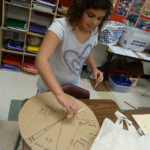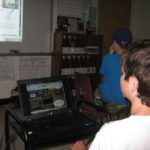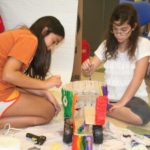Karen Hidalgo has developed a project-based unit on sustainability that has become the hallmark of Austin Jewish Academy’s fifth grade program. It has evolved over the past three years culminating in a service-learning project meaningfully integrated with Jewish studies presenting unique opportunities for students to become real world problem solvers.
Please begin with Text Introduction and proceed to Curriculum Outline.pdf
Entry Narrative
Fifth Grade Sustainability and Service Learning
Note from the Teacher Innovator:
“I believe that teaching about sustainability is not only important but necessary, in order for students to take an active role in making a difference for our planet. They can be change makers today and future environmental Jewish leaders of tomorrow. I believe that by giving students real world applications on sustainability issues, they become environmental advocates in their everyday lives, leaving footprints of positive and lasting change.”
Introduction:
Karen Hidalgo has developed a project-based unit on sustainability that has become the hallmark of Austin Jewish Academy’s fifth grade program. It has evolved over the past three years culminating in a service-learning project meaningfully integrated with Jewish studies presenting unique opportunities for students to become real world problem solvers.
Overarching Questions:
- What is sustainability? How does sustainability align with Jewish values and traditions?
- How can students become aware and possess the knowledge about environmental concerns that impact our world today and in the future?
- How can we inspire students to become environmental and social advocates to lead their generation and future generations to a more sustainable world?
Unit Objectives:
- Connect Jewish values to sustainability in a current, relevant manner.
- Develop writing skills through persuasive letter writing.
- Understand and use technology in project presentations.
- Develop engineering skills including creativity and innovation in the design and modeling process.
- Use critical thinking skills in lab experiments and model hydroponic farming.
- Develop language arts skills through conducting interviews and creating video presentations.
This Sustainability Unit is comprised of three major project based learning experiences:
1. Eco-Cooking Unit
Students interview chefs from farm to table restaurants in the Austin community to better understand farm to table menu options. With their newly acquired knowledge on the benefits of using local produce, students plan and prepare an eco-friendly menu and then present their creation in video format. As part of the overall unit, students also learn about Fair Trade. The Jewish studies teacher incorporates the resource; Jewish Food Rules published by the Jewish Farm School (Sustainable Agriculture Rooted in Jewish Traditions) studying relevant texts and food ethics. Students learn the laws of Kashrut and the concept of Tzedek Tzedek Tirdof, “the biblical imperative to pursue justice” and how it relates food justice and economic fairness.
2. Farm Service Learning
Students visit a working farm one day each week for three months. Mrs. Hidalgo and the farm educator jointly created the curriculum for students to learn about the five critical components of a successful farm enterprise which include fertility, composting, planting, Community Supported Agriculture (CSA) support, and sales and marketing. This unit focuses on Tza’ar Ba’alei Hayyim, preventing animal cruelty using various texts.
3. Eco-Advocacy
Students learn about topics affecting sustainability, such as global warming, resource management/mismanagement, and conservation. Students learn about farming in the future using hydroponics systems, composting, propagation, and cloning plants. In addition, they are introduced to the concepts of wick fed gardens, liquid nutrients, the life cycle of plants, and the water cycle. In the study of Sukkot, students learn the importance water plays in the Tanakh and in Israel today. Students explore the meaning of, Ein Mayim, Ein Torah and the prayer for rain. Students conducted an in-depth study of texts related to water as well. Food security was addressed through the parashiyot of Yosef and re-imagining the story had there been an abundance of food. Throughout this unit, students develop their critical and creative thinking skills to become advocates for the planet.
Austin Jewish Academy’s vision is, “to inspire a community of students to transform the world.” This program and our remarkable faculty inspire our students and teach them that sustainability is integral to tikkun olam – improving and repairing the Earth.
Entry Videos
This entry has been tagged with the following terms:









